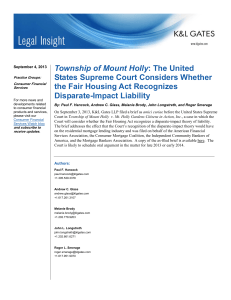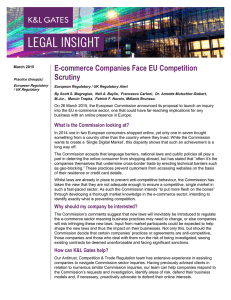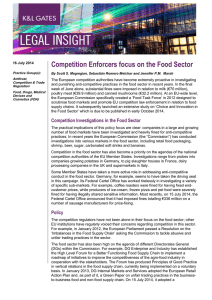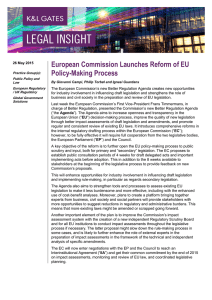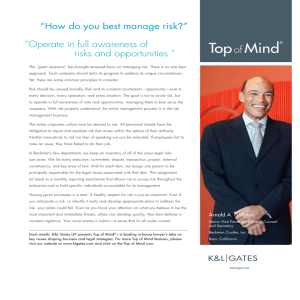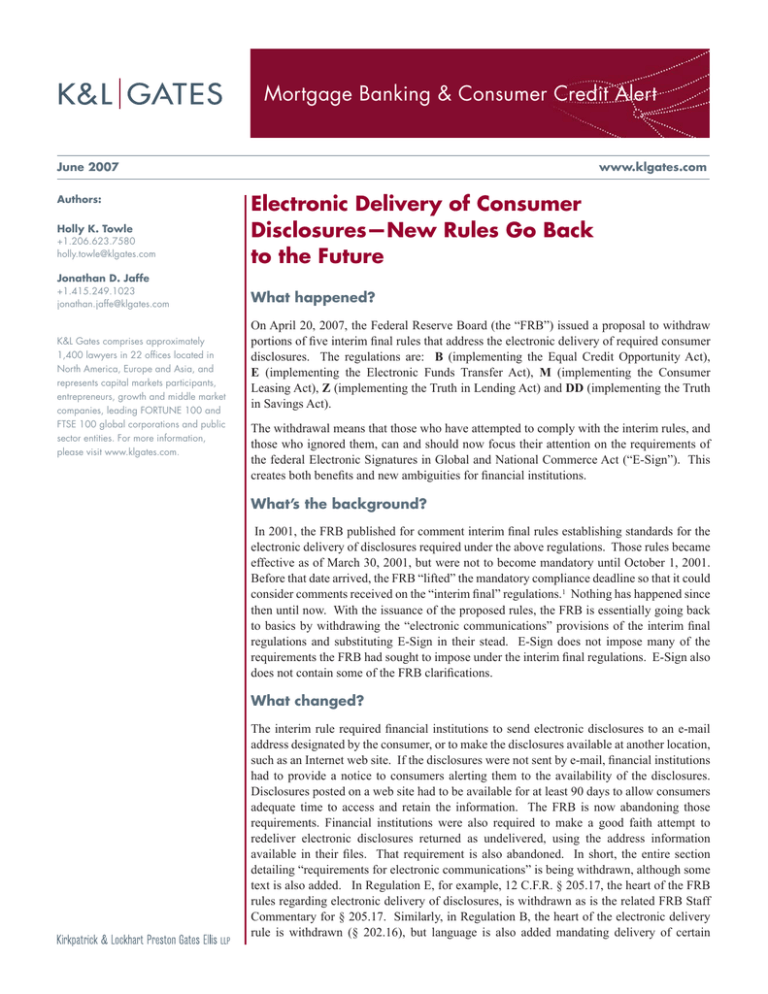
Mortgage Banking & Consumer Credit Alert
June 2007
Authors:
Holly K. Towle
+1.206.623.7580
holly.towle@klgates.com
www.klgates.com
Electronic Delivery of Consumer
Disclosures—New Rules Go Back
to the Future
Jonathan D. Jaffe
+1.415.249.1023
jonathan.jaffe@klgates.com
K&L Gates comprises approximately
1,400 lawyers in 22 offices located in
North America, Europe and Asia, and
represents capital markets participants,
entrepreneurs, growth and middle market
companies, leading FORTUNE 100 and
FTSE 100 global corporations and public
sector entities. For more information,
please visit www.klgates.com.
What happened?
On April 20, 2007, the Federal Reserve Board (the “FRB”) issued a proposal to withdraw
portions of five interim final rules that address the electronic delivery of required consumer
disclosures. The regulations are: B (implementing the Equal Credit Opportunity Act),
E (implementing the Electronic Funds Transfer Act), M (implementing the Consumer
Leasing Act), Z (implementing the Truth in Lending Act) and DD (implementing the Truth
in Savings Act).
The withdrawal means that those who have attempted to comply with the interim rules, and
those who ignored them, can and should now focus their attention on the requirements of
the federal Electronic Signatures in Global and National Commerce Act (“E-Sign”). This
creates both benefits and new ambiguities for financial institutions.
What’s the background?
In 2001, the FRB published for comment interim final rules establishing standards for the
electronic delivery of disclosures required under the above regulations. Those rules became
effective as of March 30, 2001, but were not to become mandatory until October 1, 2001.
Before that date arrived, the FRB “lifted” the mandatory compliance deadline so that it could
consider comments received on the “interim final” regulations.1 Nothing has happened since
then until now. With the issuance of the proposed rules, the FRB is essentially going back
to basics by withdrawing the “electronic communications” provisions of the interim final
regulations and substituting E-Sign in their stead. E-Sign does not impose many of the
requirements the FRB had sought to impose under the interim final regulations. E-Sign also
does not contain some of the FRB clarifications.
What changed?
The interim rule required financial institutions to send electronic disclosures to an e-mail
address designated by the consumer, or to make the disclosures available at another location,
such as an Internet web site. If the disclosures were not sent by e-mail, financial institutions
had to provide a notice to consumers alerting them to the availability of the disclosures.
Disclosures posted on a web site had to be available for at least 90 days to allow consumers
adequate time to access and retain the information. The FRB is now abandoning those
requirements. Financial institutions were also required to make a good faith attempt to
redeliver electronic disclosures returned as undelivered, using the address information
available in their files. That requirement is also abandoned. In short, the entire section
detailing “requirements for electronic communications” is being withdrawn, although some
text is also added. In Regulation E, for example, 12 C.F.R. § 205.17, the heart of the FRB
rules regarding electronic delivery of disclosures, is withdrawn as is the related FRB Staff
Commentary for § 205.17. Similarly, in Regulation B, the heart of the electronic delivery
rule is withdrawn (§ 202.16), but language is also added mandating delivery of certain
Mortgage Banking & Consumer Credit Alert
disclosures electronically if the applicant accesses the
credit application electronically. In other words, the
regulations do not completely cede electronic rules to
E-Sign.
It is noteworthy that E-Sign did nothing to change
the timing, format, content, and recordkeeping
requirements of the underlying substantive rule (e.g.,
Regulation Z and Regulation B). If, for example,
Regulation Z requires that a disclosure be delivered
at the time of application, that requirement remains
unchanged by E-Sign.
What does it all mean?
In general, the FRB is replacing its own rules with ESign. There is logic in this because E-Sign restricts how
far agencies may go in altering E-Sign, and the FRB
rules made some arguable alterations. For example,
the FRB interim rules limited electronic disclosures to
“visual” disclosures, whereas E-Sign is not so limited.
The FRB explained this as implementing its “clear and
readily understandable” standard for disclosures2 and
not as an “interpretation,”3 but a contrary argument
could have been made that the “visual” restriction
was actually a violation of the E-Sign rule prohibiting
regulators from interpreting their rules inconsistently
with § 7001 of E-Sign,4 a section that does not limit
“electronics” to visual formats.
What E-Sign rules are at issue?
Using the proposed change to Regulation E as an
example, the proposal substitutes this new rule for
e-disclosures:
The disclosures required by this subpart
may be provided to the consumer in
electronic form, subject to compliance
with the consumer consent and other
applicable provisions of the Electronic
Signatures in Global and National
Commerce Act (E-Sign Act)(15 U.S.C.
§ 7001 et seq.).5
Substantially similar language is found in the other
proposed regulations.
The “consumer consent” provision of E-Sign is
15 U.S.C. § 7001 (c), but the “other applicable
provisions” of E-Sign are spread throughout the act.
While it is beyond the scope of this Client Alert to
detail the consumer consent provisions, we will
attempt to provide a brief overview of them.
Under E-Sign, a financial institution may deliver to
consumers electronic versions of disclosures that are
required to be in writing, but only if the consumer
affirmatively consents to using electronic records and
has not withdrawn the consent.
However, before a financial institution receives the
consumer’s consent to using electronic records, the
financial institution must clearly and conspicuously
inform the consumer of:
Any right or option the consumer has to have the
record provided or made available in paper form;
The right of the consumer to withdraw consent
and any conditions or consequences (including
termination of the parties’ relationship) of the
consumer’s withdrawal of consent;
Whether the consent applies only to a single
transaction or the entire relationship between
the parties (e.g., whether it applies only to one
disclosure or all disclosures in a transaction,
whether it applies to only a particular loan or all
loans, etc.);
The procedures for withdrawing consent or
updating contact information;
How the consumer can obtain a paper copy of
the electronic record and whether any fee will be
charged for a paper copy; and
The hardware and software requirements for
access to, and retention of, the electronic records.
After receiving this disclosure, the consumer must
consent in a manner that “reasonably demonstrates”
that the consumer can access information in the
electronic form that will be used to provide the
disclosure. This could be accomplished, for example,
by requiring the consumer to acknowledge that the
consumer:
Has access to a computer with appropriate
hardware and software requirements to access
and retain electronic documents associated with
the disclosure process;
Has access to a printer or the ability to download
information for the consumer’s records; and
June 2007 | 2
Mortgage Banking & Consumer Credit Alert
Agrees to receive the required disclosures
electronically.
For a detailed explanation of E-Sign, as well as the
consumer consent rules, you may want to consult a
book co-authored by one of the co-authors of this
Client Alert.6
As many of you are aware, the federal E-Sign is not
the only law addressing “e” delivery of disclosures
and “e” signing of documents. A vast majority of the
states have enacted a version of the Uniform Electronic
Transactions Act (“UETA”). However, UETA is
not relevant to the federal regulations addressed in
the proposed regulations. While a state may avoid
E-Sign’s federal preemption of state laws by enacting
the uniform version of UETA, that ability to avoid
the federal preemption does not apply to federal
regulations.
What might you start thinking
about?
Any company that must comply with any of the
impacted regulations may wish to consider at least the
following:
Learn E-Sign Directly
Assuming the proposed regulations are issued in final
form, the FRB’s gloss on E-Sign will be gone. That
means institutions should take a fresh look at E-Sign
not only to ensure compliance, but also to discover
what might have changed. For example, the E-Sign
consumer consent rule in § 7001(c) only applies
to consumers, defined to include only individuals
obtaining products and services which are used
primarily for personal, family, or household purposes.
Contrast that to Regulation B where the soon-tobe withdrawn “electronic communications” rule
(§ 202.16) applies to “applicants,”7 a concept that
covers applicants applying for commercial or business
credit as well as applicants applying for consumer
credit. Although the Regulation B “e” rules for
business credit were not the same as for consumer
credit, even that version should not apply to business
credit if E-Sign is substituted. E-Sign consumer
consent rules are just that: consumer, not business
rules. This is just one illustration of the impact of sole
reliance on E-Sign. Changes proposed for each of the
regulations should be consulted because the proposals
are not uniform.
Don’t assume that the old rules will still
be viable, voluntary guidelines
The FRB is not simply withdrawing its
e-communications rules because it has determined
them to be unnecessary given E-Sign. The introduction
to the withdrawal proposal explains that the FRB has
determined that some parts of the interim rules are
inappropriate or burdensome. For example, the interim
regulations tell institutions to provide email notice
when a disclosure is posted on the Internet for the
customer’s review. Because many consumers do not
want to receive email notice, and in light of the realities
of “phishing,” identity theft, security and the like,
the FRB has reconsidered that requirement and now
characterizes it as neither necessary nor appropriate.
Accordingly, if the proposed regulations are adopted,
financial institutions should not assume that they
should continue on as before. In this case, change
may be both good and advisable. Having said that, we
also note that the Staff’s prefatory comments to the
proposed regulations encourage voluntary alignment
with some concepts in the interim regulations that are
being withdrawn, so financial institutions may also
want to take that into consideration when formulating
new approaches.
Consider commenting
E-Sign is more enabling of e-commerce than UETA,
but still there are gaps or ambiguities in E-Sign
that could use regulatory clarification. Submitting
comments on the proposed withdrawal may provide
an avenue for obtaining some clarification. Also, the
FRB has invited comments on various aspects of the
regulatory burden regarding collection of information.
The deadline for comments is June 29, 2007.
*
*
*
If you have any questions about the proposed changes,
the consumer disclosure provisions of E-Sign, or other
electronic commerce or consumer protection issues,
please contact Holly K. Towle (+1.206.623.7580) or
Jonathan Jaffe (+1.415.249.1023 ) / holly.towle@
klgates.com or jonathan.jaffe@klgates.com of the
K&L Gates E-Merging Commerce group.
June 2007 | 3
Mortgage Banking & Consumer Credit Alert
Endnotes
1
66 F.R. 41439, 41440 (8/8/01).
2
See 12 C.F.R. Staff Commentary to § 205.17.
3
See, e.g., proposal for Regulation E where the FRB
states that “Each of the interim final rules incorporated, but
did not interpret, the requirements of the E-Sign Act.”
4
See 15 U.S.C. § 7004(b).
5
Proposed change to 12 C.F.R. § 205.4.
6
See Holly K. Towle and Raymond T. Nimmer,
The Law of Electronic Commercial Transactions
(http://www.sheshunoff.com/store/F53.html) at Chapter
4.08 (E-Sign) and Chapter 11.09 (E-Sign Consumer Consent
Rules).
7
See 12 C.F.R. § 202.16(b).
June 2007 | 4
Mortgage Banking & Consumer Credit Alert
K&L Gates’ Mortgage Banking & Consumer Finance practice provides a comprehensive range of transactional,
regulatory compliance, enforcement and litigation services to the lending and settlement service industry.
Our focus includes first- and subordinate-lien, open- and closed-end residential mortgage loans, as well as
multi-family and commercial mortgage loans. We also advise clients on direct and indirect automobile, and
manufactured housing finance relationships. In addition, we handle unsecured consumer and commercial
lending. In all areas, our practice includes traditional and e-commerce applications of current law governing
the fields of mortgage banking and consumer finance.
For more information, please contact one of the professionals listed below.
LAWYERS
Boston
R. Bruce Allensworth
Irene C. Freidel
Stephen E. Moore
Stanley V. Ragalevsky
Nadya N. Fitisenko
Brian M. Forbes
bruce.allensworth@klgates.com
irene.freidel@klgates.com
stephen.moore@klgates.com
stan.ragalevsky@klgates.com
nadya.fitsenko@klgates.com
brian.forbes@klgates.com
+1.617.261.3119
+1.617.951.9154
+1.617.951.9191
+1.617.951.9203
+1.617.261.3173
+1.617.261.3152
thomas.poletti@klgates.com
+1.310.552.5045
paul.hancock@klgates.com
+1.305.539.3378
elwood.collins@klgates.com
steve.epstein@klgates.com
drew.malakoff@klgates.com
tom.russler@klgates.com
+1.212.536.4005
+1.212.536.4830
+1.216.536.4034
+1.202.536.4068
jonathan.jaffe@klgates.com
erin.murphy@klgates.com
+1.415.249.1023
+1.415.249.1038
holly.towle@klgates.com
+1.206.370.8334
costas.avrakotos@klgates.com
melanie.brody@klgates.com
eric.edwardson@klgates.com
steven.kaplan@klgates.com
phillip.kardis@klgates.com
rebecca.laird@klgates.com
larry.platt@klgates.com
phil.schulman@klgates.com
john.steele@klgates.com
ira.tannenbaum@klgates.com
nanci.weissgold@klgates.com
david.beam@klgates.com
emily.booth@klgates.com
krista.cooley@klgates.com
david.gaston@klgates.com
+1.202.778.9075
+1.202.778.9203
+1.202.778.9387
+1.202.778.9204
+1.202.778.9401
+1.202.778.9038
+1.202.778.9034
+1.202.778.9027
+1.202.778.9489
+1.202.778.9350
+1.202.778.9314
+1.202.778.9026
+1.202.778.9112
+1.202.778.9257
+1.202.778.9061
Los Angeles
Thomas J. Poletti
Miami
Paul F. Hancock
New York
Elwood F. Collins
Steve H. Epstein
Drew A. Malakoff
Thomas C. Russler
San Francisco
Jonathan Jaffe
Erin Murphy
Seattle
Holly K. Towle
Washington, D.C.
Costas A. Avrakotos
Melanie Hibbs Brody
Eric J. Edwardson
Steven M. Kaplan
Phillip John Kardis II
Rebecca H. Laird
Laurence E. Platt
Phillip L. Schulman
H. John Steele
Ira L. Tannenbaum
Nanci L. Weissgold
David L. Beam
Emily J. Booth
Krista Cooley
David Keith Gaston
June 2007 | 5
Mortgage Banking & Consumer Credit Alert
Anthony C. Green
Laura A. Johnson
Kris D. Kully
David G. McDonough, Jr.
Lorna M. Neill
Staci P. Newman
Stephanie C. Robinson
Kerri M. Smith
Holly M. Spencer
Erin E. Troy
anthony.green@klgates.com
laura.johnson@klgates.com
kris.kully@klgates.com
david.mcdonough@klgates.com
lorna.neill@klgates.com
staci.newman@klgates.com
stephanie.robinson@klgates.com
kerri.smith@klgates.com
holly.spencer@klgates.com
erin.troy@klgates.com
+1.202.778.9893
+1.202.778.9249
+1.202.778.9301
+1.202.778.9207
+1.202.778.9216
+1.202.778.9452
+1.202.778.9856
+1.202.778.9445
+1.202.778.9853
+1.202.778.9384
stacey.riggin@klgates.com
+1.202.778.9202
DIRECTOR OF LICENSING
Washington, D.C.
Stacey L. Riggin
REGULATORY COMPLIANCE ANALYSTS
Washington, D.C.
Dameian L. Buncum
Nancy J. Butler
Teresa Diaz
Jennifer Early
Marguerite T. Frampton
Robin L. Gieseke
Angela M. Gonzalez
Joann Kim
Brenda R. Kittrell
Dana L. Lopez
Jeffrey Prost
dameian.buncum@klgates.com
nancy.butler@klgates.com
teresa.diaz@klgates.com
jennifer.early@klgates.com
marguerite.frampton@klgates.com
robin.gieseke@klgates.com
angela.gonzalez@klgates.com
joann.kim@klgates.com
brenda.kittrell@klgates.com
dana.lopez@klgates.com
jeffrey.prost@klgates.com
+1.202.778.9093
+1.202.778.9374
+1.202.778.9852
+1.202.778.9291
+1.202.778.9253
+1.202.778.9481
+1.202.778.9369
+1.202.778.9421
+1.202.778.9049
+1.202.778.9383
+1.202.778.9364
K&L Gates comprises multiple affiliated partnerships: a limited liability partnership with the full name Kirkpatrick & Lockhart Preston Gates Ellis
LLP qualified in Delaware and maintaining offices throughout the U.S., in Berlin, and in Beijing (Kirkpatrick & Lockhart Preston Gates Ellis LLP
Beijing Representative Office); a limited liability partnership (also named Kirkpatrick & Lockhart Preston Gates Ellis LLP) incorporated in England
and maintaining our London office; a Taiwan general partnership (Kirkpatrick & Lockhart Preston Gates Ellis) which practices from our Taipei
office; and a Hong Kong general partnership (Kirkpatrick & Lockhart Preston Gates Ellis, Solicitors) which practices from our Hong Kong office.
K&L Gates maintains appropriate registrations in the jurisdictions in which its offices are located. A list of the partners in each entity is available
for inspection at any K&L Gates office.
This publication/newsletter is for informational purposes and does not contain or convey legal advice. The information herein should not be used
or relied upon in regard to any particular facts or circumstances without first consulting a lawyer.
Data Protection Act 1998—We may contact you from time to time with information on Kirkpatrick & Lockhart Preston Gates Ellis LLP seminars
and with our regular newsletters, which may be of interest to you. We will not provide your details to any third parties. Please e-mail london@
klgates.com if you would prefer not to receive this information.
©1996-2007 Kirkpatrick & Lockhart Preston Gates Ellis LLP. All Rights Reserved.
June 2007 | 6


